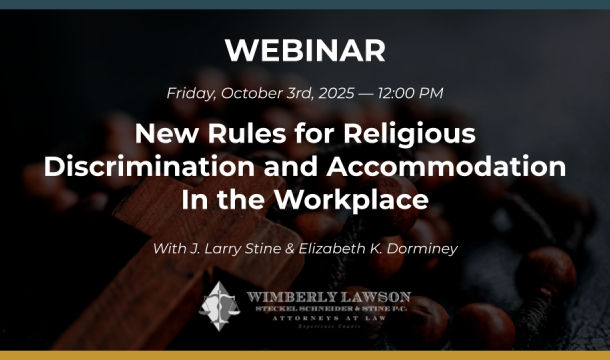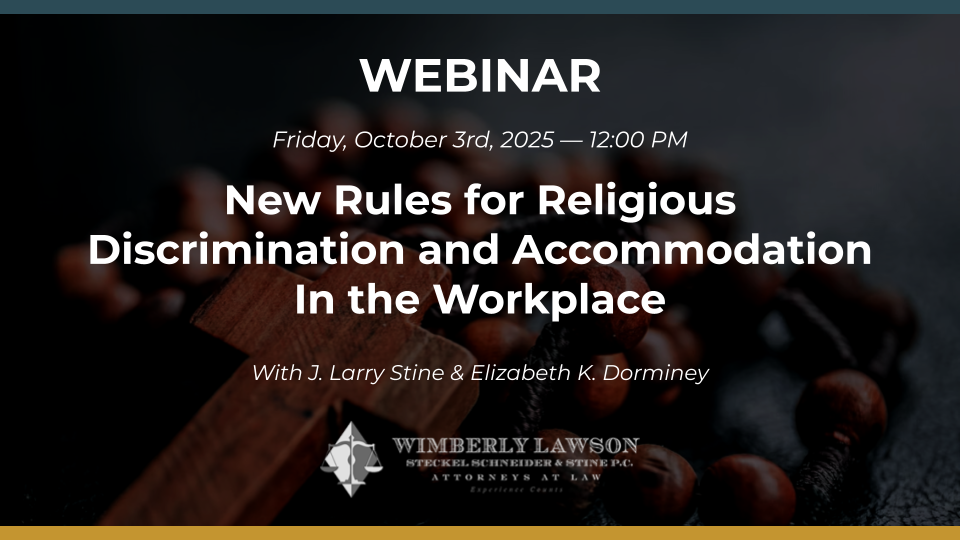WHAT THE SUPREME COURT’S GAY MARRIAGE DECISION MEANS FOR EMPLOYERS
On June 26, 2015, a narrow majority (5-4) of the Supreme Court ruled that same-sex couples have a constitutional right to marry. While some States already had recognized such marriages, the Supreme Court ruled that all States must issue marriage licenses to same-sex couples on the same basis as opposite-sex couples and must recognize the marriages of same-sex couples who were legally married in other States. Although the ruling does not apply directly to employers, it has obvious implications for them. Here are some points employers should bear in mind as they navigate the new landscape.
Religious and Other Objections: Some employers will object to the new definition of marriage for religious and other reasons. The majority expressly recognized, "The First Amendment ensures that religious organizations and persons are given proper protection as they seek to teach the principles that are so fulfilling and so central to their lives and faiths, and to their own deep aspirations to continue the family structure they have long revered. The same is true of those who oppose same-sex marriage for other reasons." Although some commentators attach little significance to this language, the majority opinion suggests that employers may still rely on the protections offered by the First Amendment (freedom of religion, speech, and assembly) in making decisions about how to deal with same-sex marriage issues. For example, in the Hobby Lobby case, the only successful challenge to Obamacare, the Supreme Court ruled that the employer did not have to provide certain forms of birth control through its health plan because of the owners' religious objections. Notwithstanding the Constitutional protections offer by the First Amendment, employers who choose not to recognize or accept same-sex marriages should expect to become the targets of litigation by gay rights advocacy groups and, possibly, the EEOC.
Health Care Benefits: Employers who offer health insurance benefits to employees and their spouses can expect insurance companies to conform their insurance policy forms to the new definition of marriage. For employers who self-insure, the plan language will determine whether the plan will provide benefits in same-sex marriage situations. For example, if an employer's plan offers health benefits to spouses, without defining the term "spouse," the plan will be interpreted to offer the same benefit to all married employees, whether same-sex or opposite-sex. By contrast, if the employer's plan defines "spouse" in accordance with the traditional definition of opposite-sex marriage, then no benefits will be available in the same-sex marriage situation. (Expect legal challenges here as well.) Because of the federal government's interpretation of Obamacare, employers are not required to offer health care coverage to spouses of employees (though coverage still must be offered to dependents). Accordingly, employers have the option of not offering health care coverage for any spouses, but they can expect resistance from the workforce if they take that course.
Other Federal Laws: Following the Supreme Court's decision in Windsor in 2013, the Federal government took steps to recognize same-sex unions on the same basis as opposite-sex marriages. Because the Supreme Court has decided that all States must recognize same-sex marriages, employers can expect all Federal laws to be enforced in accordance with the new definition of marriage. For example, covered employers will be expected to grant an employee leave to care for a same-sex spouse under the Family & Medical Leave Act (FMLA).
Increased Cost of Providing Benefits: The Supreme Court's decision will increase the number of people eligible to be covered by an employer's benefit plans, but a lot will depend on what type of plan the company already has in place. A company that already covers unmarried same-sex domestic partners could find its costs go down, because coverage for a spouse does not have negative tax implications and is easier to administer than most domestic partnership benefits. However, an employer who previously offered spousal benefits only for opposite-sex couples may see costs rise as employees with same-sex partners, who previously were not covered, will be able to add them to their insurance plans. An "unintended consequence" of this decision may be that some employers who previously offered benefits to employee spouses will cease to do so. More and more employers have been cutting spousal benefits to save money, either dropping spousal coverage or imposing surcharges on spouses who can obtain health insurance elsewhere. The Supreme Court ruling might spur some employers who were already leaning toward cutting spousal benefits to go ahead.
Tax Consequences: The court's decision should equalize the tax treatment of same-sex and opposite-sex married couples. Employers in some states faced additional payroll taxes for employees with same-sex partners, and workers in same-sex relationships often complained that they were subject to higher income tax rates than married couples. Now, neither employers nor employees will face different tax treatment for gay and straight married couples: they will be treated the same, which should make benefits easier to administer.
What About Domestic Partners? This is an interesting question, and the Court's ruling could produce some surprising results. A bit of history will provide context. For the past ten years or so, some employers offered "domestic partnership" coverage for gay employees and their partners as a means of providing equal benefits to couples who could not legally marry. Other employers offer coverage more broadly to unmarried domestic partners, regardless of sex, recognizing that some employees simply prefer not to marry but still wish to provide benefits to their partners. Employers that offered unmarried partnership benefits to both gay and straight couples may continue to do so, but employers that extend partnership benefits only to same-sex couples may begin to phase them out and cover only spouses. A policy of continuing to offer domestic partnership benefits only to same-sex couples (and excluding opposite-sex couples who choose not to marry) may make an employer vulnerable to a reverse discrimination lawsuit.
Next Steps: Every human resources department should inventory its policies and procedures, conduct training, and make necessary adjustments in response to the Supreme Court's decision.
- Consider whether to use gender-neutral terminology ("spouse," as opposed to "Husband" or "wife").
- Review your procedures so administrative personnel know how to deal with an employee who requests insurance and other benefits for a same-sex spouse.
- If the company currently offers benefits to unmarried partners, consider whether to amend or continue that policy.
- If the company previously offered benefits only to married couples, be prepared when an employee contacts human resources to add a same-sex spouse.
- Remember, marriage (like the birth of a child) may be an event that allows an employee to sign up for insurance benefits outside of the normal enrolment periods.
- Review FMLA procedures, and instruct staff to be sensitive to employees with same-sex spouses (and the couple's children).
Related Content
Get Email Updates
Recent Content

Trump Nominates Appointments to NLRB and EEOC but Policy Changes Likely to Be Delayed

DOL Launches Self-Audit Programs Designed to Help Employers Improve Compliance

DOL Must Release EEO-1 Reports to the Public under Open Records Laws

Current Advice on Active-Shooter Situations

New Policy for Federal Workers and Religious Expressions

